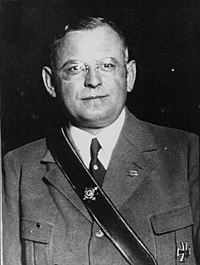Franz Seldte
This article needs additional citations for verification. (December 2008) |
Franz Seldte | |
|---|---|
 Reich Minister Seldte, 1933 | |
| Reich Minister for Labour | |
| In office 30 January 1933 – 30 April 1945 | |
| President | Paul von Hindenburg (1933-1934) Adolf Hitler Führer (1934-1945) |
| Chancellor | Adolf Hitler |
| Preceded by | Friedrich Syrup |
| In office 2 May – 23 May 1945 | |
| President | Karl Dönitz |
| Chancellor | Lutz Graf Schwerin von Krosigk (Leading Minister) |
| Personal details | |
| Born | June 29, 1882 Magdeburg, German Empire |
| Died | April 1, 1947 (aged 64) Fürth, Allied-occupied Germany |
| Nationality | German |
| Political party | DVP, NSDAP (from 1933) |
| Alma mater | Braunschweig University of Technology |
Franz Seldte (29 June 1882 – 1 April 1947) was cofounder of the German Stahlhelm paramilitary organization, a Nazi politician, and Minister for Labour of the German Reich from 1933 to 1945.
Life
Born in Magdeburg in the Prussian province of Saxony, Seldte was the son of an owner of a factory producing chemical products and soda water. He attended the Wilhelm-Raabe-Gymnasium in Magdeburg and, after an apprenticeship as a salesman, he studied chemistry at the universities of Braunschweig and Greifswald. In 1908 he took over the business of his early deceased father.
As an officer of the German Army he was wounded in World War I and lost his left arm. He then became a front reporter. Awarded with the Iron Cross 2nd and 1st class, he also was promoted to the rank of a Hauptmann (captain) in the 7th Reserve Division.
Stahlhelm
As a reaction to the German Revolution of 1918–1919, Seldte founded the Stahlhelm organization of World War I veterans on 25 December 1918, agitating against the Treaty of Versailles and German war reparations. He took over the leadership, however, from 1923 onwards he had to cope with the constant rivalry of his deputy leader, the militant Theodor Duesterberg.
Seldte became a member of the national conservative German National People's Party (DNVP) and was a member of the Magdeburg city council (Stadtrat).

During the later years of the Weimar Republic the Stahlhelm became increasingly anti-democratic and anti-republican. However, Seldte hoped that the organization could become a leading organ of a united right-wing movement. In 1929 it united its forces with the DNVP under Alfred Hugenberg, the Pan-German League and the Nazi Party to initiate a German referendum against the Young Plan on World War I reparations. The common goal was to denounce the Chancellor Hermann Müller and his ministers as traitors to their country, nevertheless the plebiscite failed to reach the quorum. In 1931 Seldte helped create the short-lived Harzburg Front, a right-wing alliance against the government of Müller's successor Heinrich Brüning.
Cabinet Hitler
Seldte had intended to lead the Nazis into a government led by him, but had to realize that Hitler would not come into this picture. On the day of the Machtergreifung on 30 January 1933, Seldte joined the Cabinet Hitler as Reich Minister for Labour, once again outdoing his long-time rival Duesterberg. In the run-up to the elections of March 1933 the Stahlhelm together with Hugenberg's national conservative German National People's Party (DNVP) attempted to make the Kampffront Schwarz-Weiß-Rot ("Black White Red Combat Front") into the dominant political camp on the right, but ultimately failed as it only gained 8.0 % of the votes cast. Nevertheless Seldte obtained a seat in the Reichstag parliament as a DNVP "guest".
On 27 April 1933 Seldte finally joined the Nazi Party and integrated the Stahlhelm members into Ernst Röhm's Sturmabteilung (SA) militia. In August 1933, he was awarded the rank of SA-Obergruppenführer and later was appointed Reichskommissar for the Freiwilliger Arbeitsdienst employment program, but was soon superseded by his state secretary Konstantin Hierl as leader of the Reichsarbeitsdienst organization. In March 1934 Seldte was made the leader of the German League of Front Fighters, a successor organization of the Stahlhem, which however was soon disbanded. In 1935 he requested to be released from official responsibilities, but Hitler refused. Seldte, without substantial power, remained Reich Minister for Labour until the end of World War II and was also a member of the Prussian government under Minister President Hermann Göring as State Labour Minister.
Seldte was captured and arrested in Mondorf-les-Bains at the end of the war and died in a US military hospital at Fürth, before being arraigned on charges.
During the time of Nazi Germany, streets were named after him in several German cities, among them his hometown Magdeburg and Leverkusen.[1]
